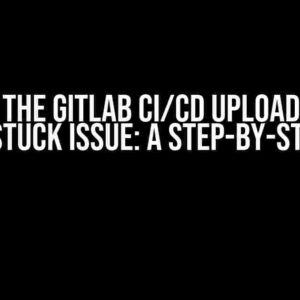Are you tired of scratching your head over inconsistent diff results between JGit and git? You’re not alone! Many developers have stumbled upon this frustrating phenomenon, leaving them wondering what’s going on under the hood. In this article, we’ll delve into the world of Git and JGit, exploring the reasons behind these differences and providing you with a comprehensive guide to tackle this issue head-on.
What’s the Difference Between JGit and Git?
In a nutshell, Git is a command-line tool, whereas JGit is a Java library that provides a programmatic way to interact with Git repositories. This fundamental difference leads to disparities in their behavior, particularly when it comes to diffing.
The Mysterious Case of Inconsistent Diff Results
So, why do JGit and Git produce different results when running the diff command? There are several reasons for this disparity:
-
Line Ending Conversions
In Git, line endings are converted to the platform’s native format when checking out files. JGit, however, doesn’t perform this conversion by default. This can lead to differences in the way line endings are represented, resulting in inconsistent diff results.
-
Charset and Encoding
JGit and Git handle character encoding differently. JGit uses the default Java charset, whereas Git respects the repository’s encoding settings. This mismatch can cause JGit to misinterpret certain characters, leading to incorrect diff results.
-
File Mode and Permissions
JGit and Git treat file modes and permissions differently. JGit may ignore certain file mode changes, whereas Git takes them into account. This can result in divergent diff results, especially when dealing with executable files or symbolic links.
How to Achieve Consistent Diff Results
Now that we’ve identified the culprits behind the inconsistent diff results, let’s explore ways to bridge the gap between JGit and Git:
1. Configure JGit to Match Git’s Behavior
To eliminate line ending conversions and charset disparities, you can configure JGit to mimic Git’s behavior:
// Create a JGit repository instance
Repository repo = new Repository("path/to/repository");
// Set the line ending conversion to match Git's behavior
repo.getConfig().setBoolean("core.autocrlf", true);
// Set the charset to match the repository's encoding
repo.getConfig().setString("i18n.logoutputencoding", "UTF-8");
2. Use JGit’s `DiffFormatter` with Care
JGit’s `DiffFormatter` class provides a way to customize the diff format. However, it’s essential to use it correctly to avoid inconsistencies:
// Create a DiffFormatter instance
DiffFormatter df = new DiffFormatter(DisableHrefTarget.SYM_LINK);
// Set the file mode and permissions correctly
df.setRepository(repo);
df.setFileModeFormatter(new FileModeFormatter(repo));
3. Integrate Git into Your Java Application
If you’re stuck with using JGit and still want to achieve consistent diff results, consider integrating Git into your Java application using the `Runtime` class:
// Create a Git process
Process gitProcess = Runtime.getRuntime().exec("git diff --no-index file1 file2");
// Capture the output and parse the diff result
String diffOutput = getOutputFromProcess(gitProcess);
DiffResult diffResult = parseDiffOutput(diffOutput);
Best Practices for Using JGit and Git
To avoid inconsistencies and ensure seamless integration between JGit and Git, follow these best practices:
-
Use Consistent Configurations
Ensure that your JGit and Git configurations are identical, including line ending conversions, charset, and file mode settings.
-
Test and Validate
Thoroughly test and validate your diff results using both JGit and Git to ensure consistency.
-
Avoid Overriding Default Behavior
Be cautious when overriding JGit’s default behavior, as it may lead to inconsistencies with Git. Instead, work with the default settings and adjust as needed.
-
Stay Up-to-Date with the Latest Versions
Regularly update your JGit and Git versions to ensure you have the latest bug fixes and features.
Conclusion
The mysterious case of inconsistent diff results between JGit and Git can be solved by understanding the underlying differences and taking steps to configure JGit correctly, use the `DiffFormatter` wisely, and integrate Git into your Java application. By following best practices and staying vigilant, you can overcome the disparities between these two powerful tools and achieve consistent diff results.
| Tool | Platform | Line Ending Conversion | Charset and Encoding | File Mode and Permissions |
|---|---|---|---|---|
| JGit | Java | Optional (default: off) | Default Java charset | Optional (default: ignored) |
| Git | Command-line | Enabled (platform-native) | Repository-encoded | Enabled (mode and permissions) |
Now that you’ve conquered the realm of JGit and Git diffing, you’re ready to tackle even the most complex version control challenges. Remember, consistency is key, and with the right approach, you can achieve harmony between these two powerful tools.
Frequently Asked Question
Get the answers to your burning questions about the differences between JGit diff and Git diff!
What is the main reason for the difference in results between JGit diff and Git diff?
The primary reason for the difference in results is that JGit and Git use different algorithms to compute the diff. JGit uses a pure Java implementation, while Git uses a native implementation, which can lead to differences in the way they handle certain edge cases, such as line endings and file renames.
Can I configure JGit to produce the same results as Git diff?
Yes, you can configure JGit to produce similar results to Git diff by settings certain options, such as ignoring whitespace changes or using the same diff algorithm as Git. However, it’s essential to note that achieving identical results might not always be possible due to the differences in implementation.
How do I troubleshoot differences between JGit diff and Git diff?
To troubleshoot differences, start by checking the JGit and Git versions, as well as the configuration settings. Next, compare the output of both commands to identify the specific differences. You can also use tools like `git diff –no-index` to compare the actual file contents instead of relying on the Git index.
Can I use both JGit and Git diff in my application?
Yes, you can use both JGit and Git diff in your application, depending on your specific requirements. For example, you might use JGit for Java-based operations and Git diff for command-line operations or when interacting with the Git repository directly.
Are there any specific scenarios where JGit diff is more suitable than Git diff?
Yes, JGit diff is more suitable when you need to perform diff operations within a Java application, as it provides a pure Java implementation. Additionally, JGit diff can be more efficient when dealing with large repositories or complex diff operations, as it doesn’t require spawning a new Git process.


